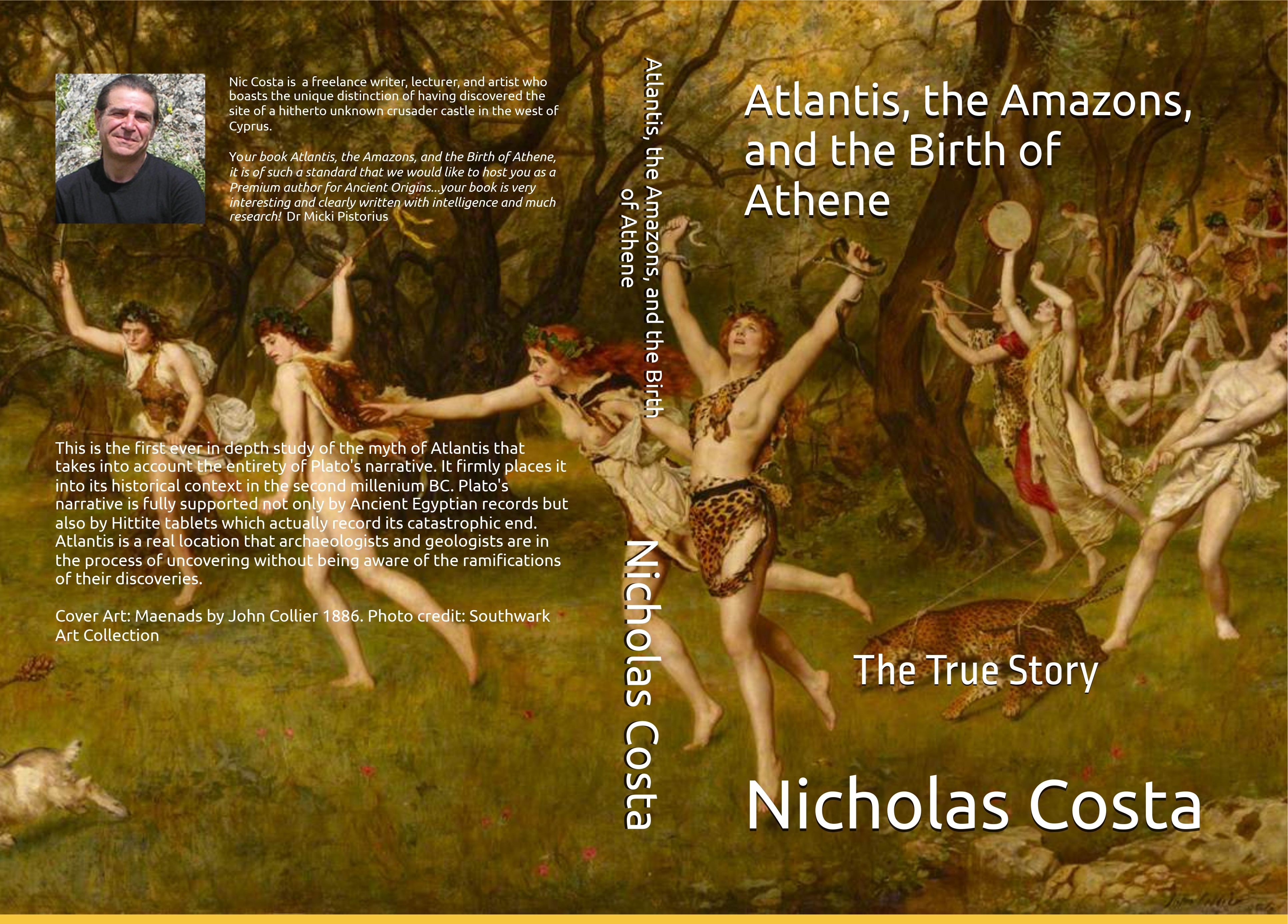Category: Uncategorized
-
Atlantis in the Book of Revelation
Atlantis in the Book of Revelation © Nicholas Costa 2024 (Volcano lightning. Credit: Native Redcloud 3) Saint John the Apostle was said to be the author of the Book of Revelation, the final book of the New Testament. Its title is derived from the first word of its Greek text: apokalypsis, meaning ‘revelation’. The word…
-
Finding the true identity of the Amazons (part two)
European nations depicted as women for ignoring the threat from the east 1895 The true identity of the Amazons © Nicholas Costa 2024 PART TWO Here follows a brief tour of the prevailing ethos in the Middle East in antiquity. Sumer (Sumer is the earliest known civilization, located in the historical region of southern Mesopotamia,…
-
Finding the true identity of the Amazons (part one)
Image: Cartwright, Mark. “Warrior & Amazon.” “Vaginas have received you, and you know of nothing else!” Finding the the true identity of the Amazons © Nicholas Costa 2024 Feminist Amazons? In the conclusion to her essay in the Feminist Theology magazine Olga Papamichali writes: “The independent and radical nature of the Amazon spirit changed the…
-
Atlantis in the Sybilline Oracles-(part three- Corcyra)
Nisyros volcano- The key to understanding the volcanic metaphors of Odysseus’ journeys, Circe (circle); the Cyclops, a giant with one eye who throws rocks. Atlantis, the Sybilline Oracles, and Corcyra © Nicholas Costa 2024 The following reference at first sight appears to be out of place. Every location mentioned in the Sibylline text is in…
-
Atlantis and the Sibylline Oracles (part two- Eridanus)
Atlantis, the Sibylline Oracle, and Eridanus © Nicholas Costa 2024 The text refers to Eridanus. Eridanus wasn’t a city, or a person, it is a reference to a constellation: “And then, when they shall have bewailed their land reduced to ashes, by Eridanus.” Eridanus significantly appears in the myth of Phaeton (the shining one) who…
-
Atlantis in the Sibylline Oracles (part one)
Atlantis in the Sibylline Oracles © Nicholas Costa 2024 In AD 17 the region of Lydia in western Asia Minor was subjected to a huge earthquake. Pliny called it “the greatest earthquake in human memory” (Nat. Hist. 2:86 §200). Twelve cities in the region were devastated. They were Sardis, Magnesia, Temnos, Philadelphia, Aegae, Apollonis, Mostene,…
-
Atlantis was destroyed c1327 BC
Atlantis was destroyed c 1327 BC © Nicholas Costa 2024 Plato gives specific dates in his narrative as to the catastrophe which overwhelmed Atlantis. They have consistently been ignored or grossly misinterpreted. He cites ‘9000’ years and his source as an ancient record copied from a temple in Egypt. The ancient Egyptians originally measured time…
-
Plato’s ‘Libya’ was in Asia Minor
The Three Continents named wrongly © Nicholas Costa 2024 A very important clue is to be found in Strabo’s Geography (1.4.) where he writes: “and the Greeks named the three continents wrongly, because they did not look out upon the whole inhabited world, but merely on their own country and that which lay in the…
-
Ethiopia -an ancient joke
Ethiopia- an ancient joke © Nicholas Costa 2024 The word ‘Ethiopian’ used to describe the fish eaters of Mene in the myth of Myrina actually does not refer to the place in Africa. Greek use of place names in early myth was to say the least very flexible, Ethiopia did not always refer to a…
-
Common sense approach
It seems that nobody has wanted to solve the Atlantis mystery…until now. Plato is quite explicit in terms of its chronology, exact location, dimensions, and place in history. Read on: What’s in a name? Plato in his Cratylus highlights the following: “Do you think it is an ordinary matter to learn how much more correct…
